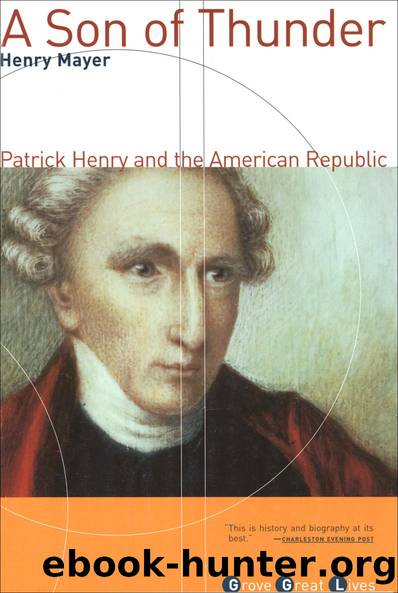A Son of Thunder by Henry Mayer

Author:Henry Mayer [Mayer, Henry]
Language: eng
Format: epub
Tags: History, United States, Colonial Period (1600-1775), Biography & Autobiography, Political, Revolutionary Period (1775-1800)
ISBN: 9780802198099
Google: QAKQC4a4N2QC
Publisher: Open Road + Grove/Atlantic
Published: 2007-12-01T00:25:49+00:00
CHAPTER 15
âI Own Myself a Democratâ
âThe time hath found us,â a pamphlet entitled Common Sense announced in January 1776. Offering ânothing more than simple facts, plain arguments, and common sense,â this writer fashioned the most compelling argument yet made for continental independence. Henry, along with a hundred thousand other readers, thrilled to find his deepest thoughts expressed in print. âThe period of debate is closed,â Common Sense emphasized; âa new era for politics is struck.â âArms as the last resource decide the contest,â and the hopes we entertained before âthe commencement of hostilitiesâ (at Lexington in April 1775) are now as âuselessâ as last yearâs almanacs.
Yet the war had settled into stalemate almost as soon as it had begun. Washingtonâs raw continental forces had kept General Gage besieged in Boston, but Congressâs hope for the quick military conquest of Quebec had ended in retreat. In March 1776, Gage, too, retreatedâto the British base at Halifax, Nova Scotiaâbut the American command fully expected him to return as part of the major British force expected by the summer.
In the spring of 1776 the continental battle remained a political one. Common Sense fired the imaginations of the committed by joining the issues of independence and democratic government. The pamphletâs argument rested upon the natural ability of all people to reason and think for themselves. On that foundation, which reached deep into the dissenting traditions of both evangelical religion and Whig politics, the writer boldly attacked the idea of monarchy as tyrannical and unnecessary. Kings did nothing more than give away jobs and make war, he wrote: âOf more worth is one honest man to society, and in the sight of God, than all the crowned ruffians who ever lived.â Common Sense mocked the idea of the âdivine rightâ of kings, irreverently described William the Conqueror as a âFrench bastardâ who had mobbed the English throne with his âarmed banditti,â and castigated George III as âthe royal brute of Britain.â
Having stripped the mystique from royalty, the pamphlet insisted, âA government of our own is our natural right,â and it emphasized that simple representative assemblies elected under law would be adequate government for a virtuous, republican people like the Americans. Anything short of independence and republican government would be âpatchworkâ that only âleaves the sword to our children.â âThere is something very absurd in supposing a continent to be perpetually governed by an island,â the writer argued, for just as nature made satellites smaller than planets, so did nature indicate that England belongs to Europe and âAmerica to itself.â The American cause, Common Sense prophesied, would become the cause of freedom itself. âEvery spot of the Old World is overrun with oppression ⦠O! ye that love mankind,â the writer pleaded, âprepare in time an asylum for liberty.⦠the birthday of a new world is at hand, and a race of men, perhaps as numerous as all Europe contains, are to receive their portion of freedom from the events of a few months.â
Common Sense made
Download
This site does not store any files on its server. We only index and link to content provided by other sites. Please contact the content providers to delete copyright contents if any and email us, we'll remove relevant links or contents immediately.
| Americas | African Americans |
| Civil War | Colonial Period |
| Immigrants | Revolution & Founding |
| State & Local |
In Cold Blood by Truman Capote(3374)
The Innovators: How a Group of Hackers, Geniuses, and Geeks Created the Digital Revolution by Walter Isaacson(3147)
Steve Jobs by Walter Isaacson(2889)
All the President's Men by Carl Bernstein & Bob Woodward(2363)
Lonely Planet New York City by Lonely Planet(2217)
And the Band Played On by Randy Shilts(2197)
The Room Where It Happened by John Bolton;(2150)
The Poisoner's Handbook by Deborah Blum(2135)
The Innovators by Walter Isaacson(2098)
The Murder of Marilyn Monroe by Jay Margolis(2095)
Lincoln by David Herbert Donald(1982)
A Colony in a Nation by Chris Hayes(1927)
Being George Washington by Beck Glenn(1912)
Under the Banner of Heaven: A Story of Violent Faith by Jon Krakauer(1788)
Amelia Earhart by Doris L. Rich(1689)
The Unsettlers by Mark Sundeen(1682)
Dirt by Bill Buford(1670)
Birdmen by Lawrence Goldstone(1662)
Zeitoun by Dave Eggers(1643)
